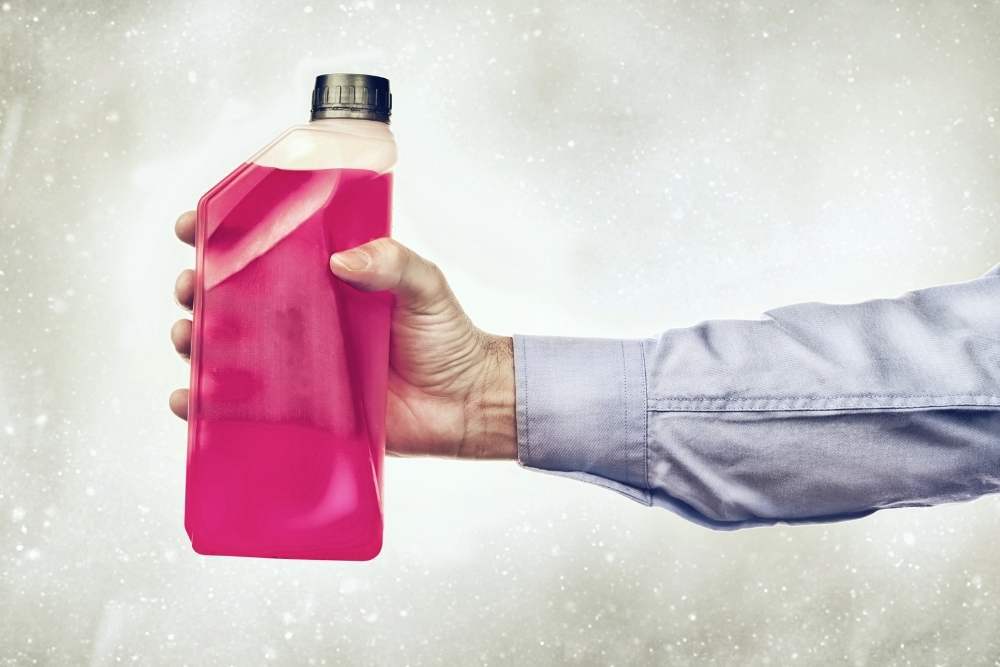RV’s are great to have on hand for a variety of reasons. One core reason is that they allow you to visit many different places in one trip and don’t require as much effort or planning because you already have a place to sleep. The only downside is that keeping them up-to-date can become kind of expensive if you have an older RV.
People love RV luxury options, and it can sometimes be an even better investment than a home. However, just because it is like a combination of a car and your living space, there are many more things to worry about when you travel with them.
Having a working RV means being able to do preventative maintenance. One important piece of that upkeep is the use and replacement of antifreeze as needed.
Does RV antifreeze go bad, and what is the shelf life of antifreeze? The answer to the question of whether RV antifreeze expires or goes bad is that it does not. If you store your water correctly, you can use it any time from 1-5 years. This will help keep both your pipes and your RV running smoothly as well.
RVs use a different kind of antifreeze from the one used in cars. It can go bad after a year on the shelf; you will want to buy new antifreeze after that and change it every two or three years.
RVs have a few differences from those in the automotive realm, and it’s important to know when you should start buying antifreeze. Mixing up RV antifreeze can lead to dangerous conditions, and you should be careful that they are two entirely different substances.
Many people think that owning a recreational vehicle is too much work, but there are ways to keep the fun in this process. With a well-maintained RV that offers you easy travel, it can be worth all of your trouble. You just have to know how and when to make those basic repairs yourself so you can enjoy your experience outside!
Before you set off on your first family or camping trip, take time to read the owner’s manual and speak with a professional technician about how your specific model RV is powered.
How to Tell If RV Antifreeze is Bad or expired?
When RV antifreeze is premixed, it lasts from 1 to 5 years, and engine antifreeze does not go bad or expire. You can buy a large batch of the fluid and use it regularly without worrying about whether or not the expiration date has passed.
However, if the label has a particular date on it, you should always listen to the label. If that expiration date is passed, that may not work as well.
You can test antifreeze by putting it in the freezer and seeing if it stays liquid. If fresh antifreeze turns into ice, then you need to toss the antifreeze out.
The Difference Between Car and RV Antifreeze
Some coolants may last longer than others, but not all antifreeze is meant for the same thing.
Inside your RV, antifreeze prevents the system from freezing and helps flush anything too hot or cold out. It keeps the air inside of your RV comfortable and makes it run more efficiently.
Automotive antifreeze is usually in a highly toxic form, which is why RV antifreeze is almost always non-toxic.
Automotive antifreeze cannot be used anywhere else but is only meant for a car or truck engine. It contains chemicals that don’t serve any purpose in an RV.
Antifreeze is necessary for a car to operate and extends the life of the engine. However, it leaves traces in water that can poison animals and plants.
One of the positives of RV travel is being able to break up long drives with your family by stopping for a day.
Why Does An RV Need Antifreeze?
Pink is the universal color for RV antifreeze. Before any trip, you will want to grab a bottle with that beautiful pink label — it is easy to spot from afar.
When you buy antifreeze, make sure to pour it down every sink in your RV before you leave. You’ll want to do this for the kitchen, bathroom, showers, toilet, and anything else.
Water and temperature regulation is crucial to the wellbeing of your RV; you won’t want a pooling water system or freeze pipes in some parts of the RV.
Whether or not you need to add antifreeze is up to how you’re taking care of the engine. Some vehicles use an exhaust system that keeps hot air directed onto a heater near your RV’s water tank, so this antifreeze issue shouldn’t be very common.
Before you buy antifreeze for your RV to use, make sure this is the appropriate type of product for your particular model, and do not use toxic antifreeze.
Where Do You Buy Antifreeze for Your RV?
RV antifreeze is readily available at most convenience stores for just about any decent engine. The only thing you might need to do is look for the bright pink bottle to locate it.
That is one way you can tell the difference between RV and automotive coolant. Only cooling liquid used on electrical motors contain cyanide-cyanate of potassium chloride.
You can find options for antifreeze at most Walmart’s, grocery stores, Target’s, and more. Some gas stations usually have options to choose from.
Some gasoline retailers offer a variety of choices, as well as some other odds and ends you may need for your vehicle.
There are many options for you if you want to travel in the RV while being frugal, whether you plan to stay close to home or venture out.
Can a Regular Mechanic Look at Your RV?
An RV is a huge machine that acts as your home, and it requires constant maintenance. Your car might break down, but you can get another one as there will always be space for even the biggest SUV at the mechanic shop.
However, many mechanics lack the space to service a full-size RV.
Some of the pieces inside an RV engine are different from a car’s engine. You will also need to find someone who works with RVs because they have more room for your vehicle than most mechanics would.
Is It Hard to Maintain An RV?
Owners of RVs should often take care of their properties for them to stay in tip-top shape. They can fix the necessary auto work by doing routine maintenance on vehicles and keep them running smoothly without any much trouble.
And there is a lot of work involved in ensuring the vehicle’s outside and inside stays clean.
RVing can be rewarding, exciting, and a huge financial investment– but it does need work in order to maintain and use as intended.
Conclusion
If you are considering buying an RV of your own, make sure to do some research. Look into how old the model is and what cost might be associated with maintenance in terms of time or money when deciding on a purchase date. The good news is that antifreeze usually doesn’t need to be a thought until later.
To get an affordable RV, consider negotiating the price and finding one that fits your budget. There are many other things involved here as well.
If you’re looking to sell your home and purchase an RV, you must find one that suits your needs. Make sure it has adequate storage space so that you can pack all of the items for your trip with ease.
If you find the perfect RV, but it doesn’t have much storage space, then you’ll want to explore other options, such as renting a storage unit. These are just some of the things that you should consider when buying an RV.
No matter how much or little you use your RV, it needs maintenance. Fill up the tanks with antifreeze before a cold winter trip and opt for a spare gallon in case of emergency while on the road. If you need RV antifreeze, you can usually find a giant pink bottle of the fluid at most places selling it.
Does RV Antifreeze Go Bad or Expire? In its original bottle or the pipes, antifreeze fluid should not expire for a very long time unless specific shelf life information is available.


